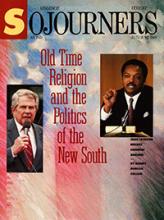They spoke a language both mesmerizing and incomprehensible. For seven days the deaf students of Gallaudet University waged one of the most articulate, effective, well-organized, and well-publicized protests, and they waged it on television, in the print media, and even through radio reportage. When the university's board of directors in early March selected a hearing person as president -- despite the objection of many in the deaf community -- the deaf students demanded that the premier institution of deaf people in the United States be headed by a deaf person.
Read the Full Article

Already a subscriber? Login
